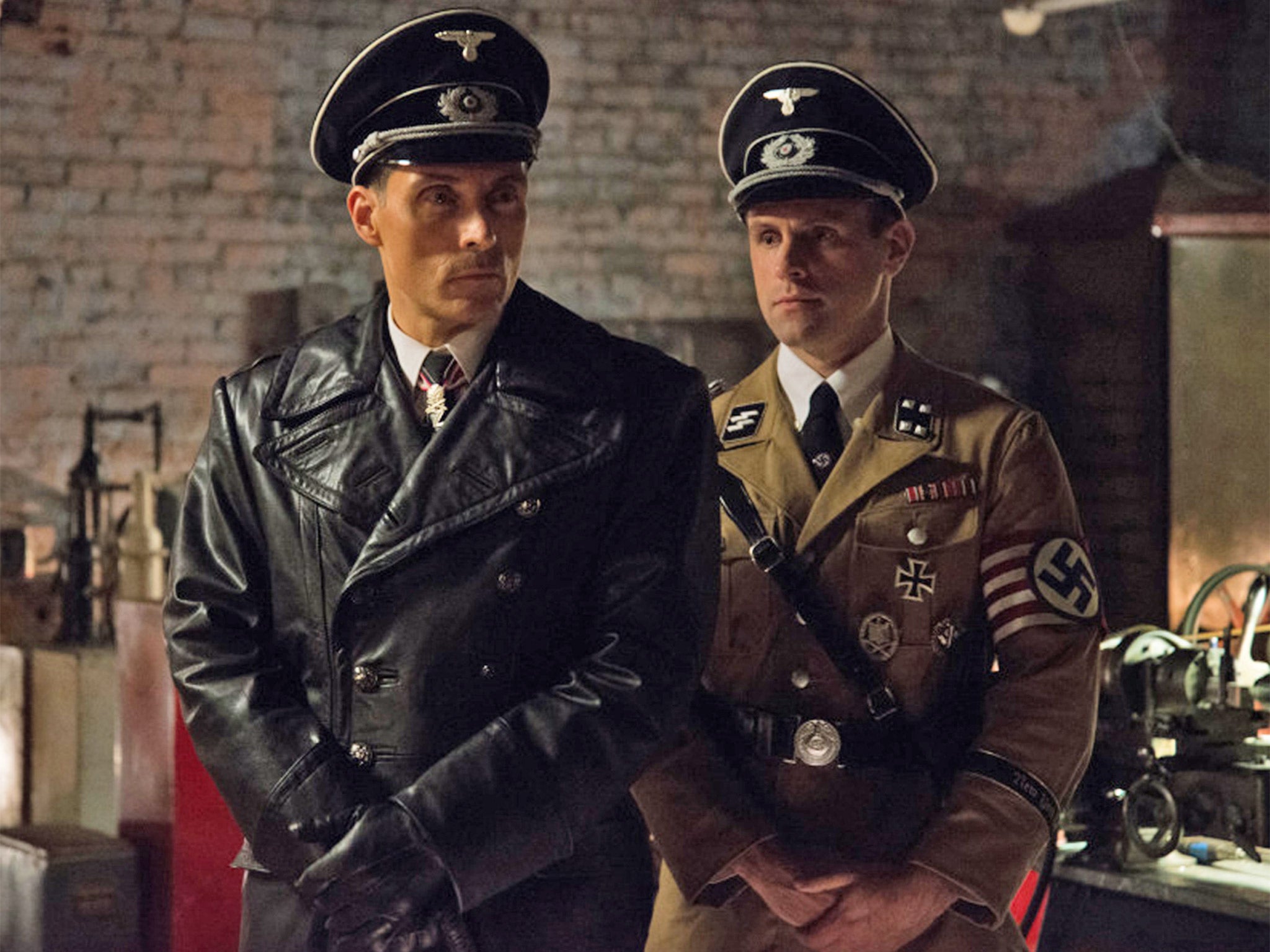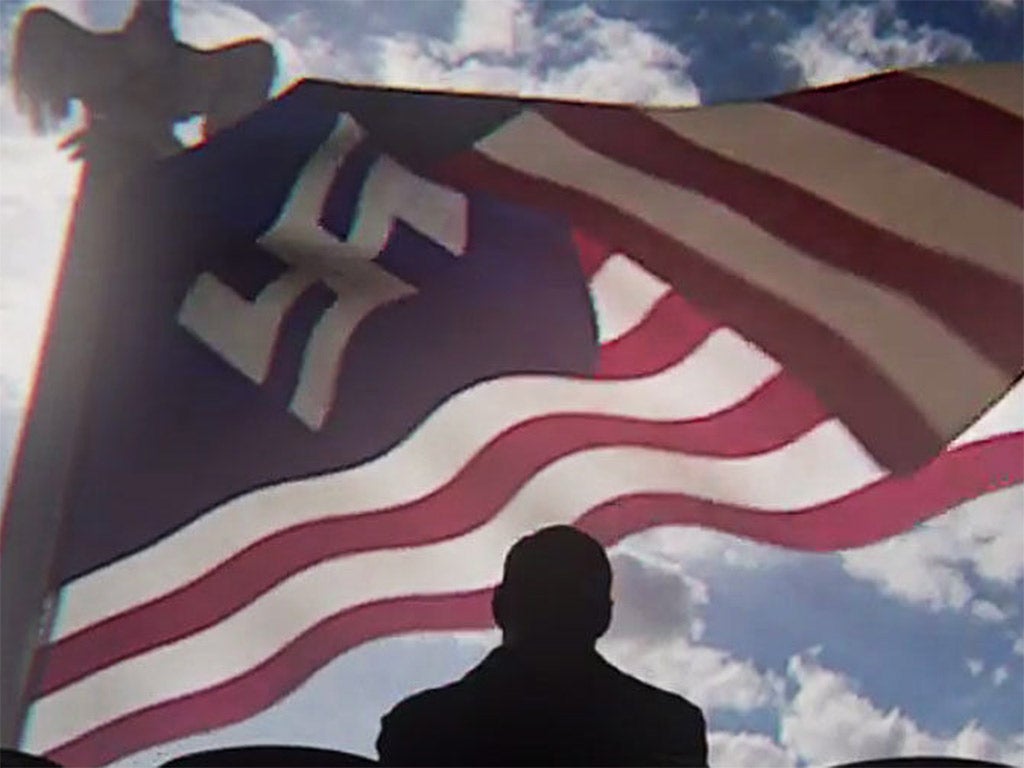The Man in the High Castle: is it about the zeitgeist or the uniforms?
What if the Allies had lost? With two new series looming, ‘counterfactualism’ is a rich seam for TV drama. But is it about the zeitgeist or the uniforms?

Your support helps us to tell the story
From reproductive rights to climate change to Big Tech, The Independent is on the ground when the story is developing. Whether it's investigating the financials of Elon Musk's pro-Trump PAC or producing our latest documentary, 'The A Word', which shines a light on the American women fighting for reproductive rights, we know how important it is to parse out the facts from the messaging.
At such a critical moment in US history, we need reporters on the ground. Your donation allows us to keep sending journalists to speak to both sides of the story.
The Independent is trusted by Americans across the entire political spectrum. And unlike many other quality news outlets, we choose not to lock Americans out of our reporting and analysis with paywalls. We believe quality journalism should be available to everyone, paid for by those who can afford it.
Your support makes all the difference.Seventy years after the end of the Second World War, we are still left with a gently nagging question. What if we hadn’t won?
It’s something that many authors have turned their attention to over the years, a strand of the alternative or counter-factual sub-genre that proliferates in science fiction, fantasy and thrillers, with perhaps the most famous example being Len Deighton’s 1978 novel SS-GB.
The thriller, set nine months after a successful German invasion of Britain in 1941, is about to go into production as a five-part BBC drama, written by the duo behind Skyfall and Casino Royale. It stars American actress Kate Bosworth (of last year’s movie Still Alice) in her first TV role and Yorkshire’s Sam Riley as the lead, Scotland Yard detective Douglas Archer, who now finds the pursuit of justice is carried out under the iron heel of the dreaded SS.

Beginning as a seemingly straightforward police investigation into a murder, the story spirals out into a plot involving the imprisoned King George and the development of atomic weapons. Deighton’s novel is horrifyingly plausible, with the decisive Battle of Britain going the Nazis’ way, allowing German forces to land at Kent and march on London. The Royal family flees to New Zealand; Churchill is tried for war crimes in Berlin and summarily executed.
This game of “what if?” has been played by authors other than Deighton, too. Fatherland, by Robert Harris, is set in Nazi Germany in 1964, and follows a similar pattern to SS-GB. Farthing – in which Britain withdraws from hostilities in 1941 – is a more subtle take by Jo Walton, a Welsh novelist. And trippy science fiction author Philip K Dick’s 1962 classic The Man in the High Castle portrays a United States that has been conquered and divided up after a war that raged until 1947, with the Germans controlling the East Coast and the Japanese the west. That’s coming to TV, too. Amazon’s pilot earlier this year was well-received and a full adaptation is due next month.
The Man in the High Castle features at its heart a novel called The Grasshopper Lies Heavy, banned by the occupying German authorities because it posits a world where Britain and the US triumph against the Axis powers – a counterfactual within a counterfactual. As with SS-GB, emerging nuclear capability plays a big part in the plot, this time in the hands of the Nazis rather than the Allies.
Could we be seeing something of a TV trend emerging? Film critic and pop culture commentator Kim Newman thinks alternate history for the masses, while a staple of genre fiction, might still be something of a niche. “The whole ‘Nazis won the war’ is the most familiar type of storyline – there was a 1994 TV adaptation of Fatherland and there was a BBC series in 1978 called An Englishman’s Castle which was set in a Nazi-occupied Britain. But other types of alternative histories could still be something of a hard sell. A lot of people might not really get it, and you have to explain from the outset that this is something that didn’t actually happen. And though SS-GB and The Man in the High Castle are big books, bear in mind that it’s taken 40 or 50 years to bring them to TV.”
But could re-imagining history – especially something so epochal as the Second World War – actually lessen the impact of what happened? “I think it’s all harmless fun,” says TV historian Dan Snow, adding that it can have some value in our understanding of the world and what forged it. “Counterfactuals do remind people that – unlike in Greek mythology, where three sisters spun our fates and there was little we mortals could do to change it, in our world outcomes are uncertain and volatile,” he says. “The present is far more exhilarating if we know multiple and very different futures are possible.”
But it’s not just fiction authors who like to ponder such imponderables. Historian Niall Ferguson gave “what ifs” the academic treatment in his 1997 book Virtual History, pondering what might have happened if, say, Kennedy had not been assassinated, or if Britain had stayed out of the First World War. Other historians are less convinced that one single event – or lack of it – can massively alter the course of history. Among them is Richard J Evans, Regius Professor of History at the University of Cambridge, who last year wrote a rebuttal of counterfactual history theory, Altered Pasts.

“Novels such as SS-GB are great fun,” says Evans. “But they are there to titillate the imagination rather than offer serious debate about what events might actually have caused history to change. One single alteration in a timeline does not necessarily change everything. If one thing is changed, there might be a whole series of other alterations that cause things to remain as they actually were. For example, people say that if Britain had not entered the First World War, the conditions for the rise of Hitler would not have been created. But we don’t know what other things might have happened in, say, 1925 that might have affected things.”
However, while historians argue over the value of counterfactual history, and pundits discuss its place in the zeitgeist, an uncomfortable suspicion nags at your correspondent. Namely, the average viewer can’t get enough of those sinister uniforms designed by Hugo Boss. Every shred of footage from the Third Reich has been packaged and repackaged in such series as The Dark Charisma of Adolf Hitler, The Nazis: A Warning from History and Hitler’s Bodyguards. Every significant action and campaign has its own movie, from Pearl Harbour to Das Boot. So familiar have these images become that unfamiliar ones need to be manufactured. Thus, if you scroll down to the one-star efforts on Netflix, you’ll find such fantasies as Iron Sky (Nazis escape to the moon). In the bargain bin, there’s Zombie Lake (Wehrmacht officers return from the dead). On permanent repeat, there’s Raiders of the Lost Ark. So perhaps, whatever the crimes of Hitler’s henchmen, tomorrow belongs to them.
The Man in the High Castle is available to view on Amazon Prime Video from 20th November.
Join our commenting forum
Join thought-provoking conversations, follow other Independent readers and see their replies
Comments